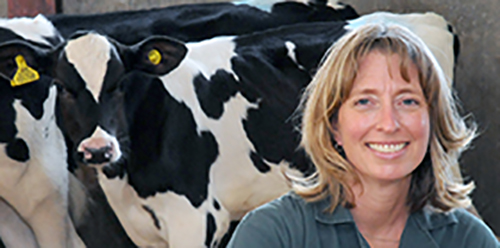Responsible use of antimicrobials on farms
Reducing antibiotic use in farming and livestock production is imperative to help reduce the global burden of AMR
What is the problem?
There is a widely held view that the use of antimicrobials in farming substantially influences the prevalence of antimicrobial-resistant infections in humans. Whilst there is limited evidence for this, transmission of resistant bacteria from animals to humans and back again can occur, and selection of resistance in human bacteria via antimicrobials released into the environment from farms is also possible.
In response to this potential threat, governments, veterinarians, food producers and farming organisations are driving down the usage of antimicrobials in some countries around the world and particularly in the UK.
What is the solution?
AMR research at the Bristol Veterinary School is promoted and facilitated by the AMR Force led by Prof Kristen Reyher. This interdiscplinary team are focused on decreasing antimicrobial use while improving animal health through a variety of approaches.
The AMR Force collaborate with researchers, practitioners and industry bodies across the food chain to influence the use of antimicrobials in the livestock sector. Working to change both policy and practice, the team have engaged farmers and veterinarians, retailers and suppliers, as well as farming, medical and industry stakeholders.
The aims of the team are to share the results of their research widely, and the group actively participates in initiatives to inform policy and influence the national research agenda.
Outcome and next steps
The AMR Force has inspired and enacted change in antimicrobial use on farms and in veterinary prescribing practice through intensive collaboration and dialogue with suppliers, retailers, veterinarians, software development companies, livestock farmers and the livestock industry and government agencies (Defra and the Veterinary Medicines Directorate). The team won the 2018 and Agriculture and Food award at the Antibiotic Guardian Awards for its pioneering work in this sector and went on to win the 2019 Antibiotic Guardian Award for Research and the 2023 Antibiotic Guardian Award for Prescribing and Stewardship as well as Highly Commended in the 2023 Community Communication category, both as part of Arwain DGC. AMR Force also took home the Veterinary Record Impact Award for 2019. The team continues to help drive the UK's reduction in antimicrobial use in livestock production while improving animal health.

Researchers involved (Bristol Vet School, unless stated otherwise)
- Prof Kristen Reyher
- Prof David Barrett
- Dr Sion Bayliss
- Prof Andrew Dowsey
- Dr Tristan Cogan
- Dr Alex Tasker
- Dr Irene Bueno
- Dr Andrea Turner
- Prof Matthew Avison (School of Cellular and Molecular Medicine)
- Dr Katy Turner (Honorary)
Funding
- AHDB Beef and Lamb
- AHDB Dairy
- BBSRC
- Coombe Farm
- Department for Environment Food & Rural Affairs (DEFRA)
- Department for Health and Social Care
- EPSRC BristolBridge
- ESRC
- EU H2020
- MSD Animal Health
- NERC
- Soli Association
- The Langford Trust
- WD Farmers
- Zoetis UK
Contact
Prof Kristen Reyher
email: kristen.reyher@bristol.ac.uk
Tel: +44 (0) 117 33 19321
website: AMR Force
Press releases and useful links
- Veterinary surgeons awarded ‘impact award’ for changing antimicrobial use in veterinary practice
- Farmer-led research tackling antimicrobial resistance wins Antibiotic Guardian awards (2019)
- Bristol's Veterinary School's AMR Force wins Antibiotic Guardian Award (2018)
- Bristol Vet School at the forefront of combatting antimicrobial resistance
- Bristol Vet School leading the way to change antimicrobial use on farms
- How are antimicrobials used around the world in food-producing animals?